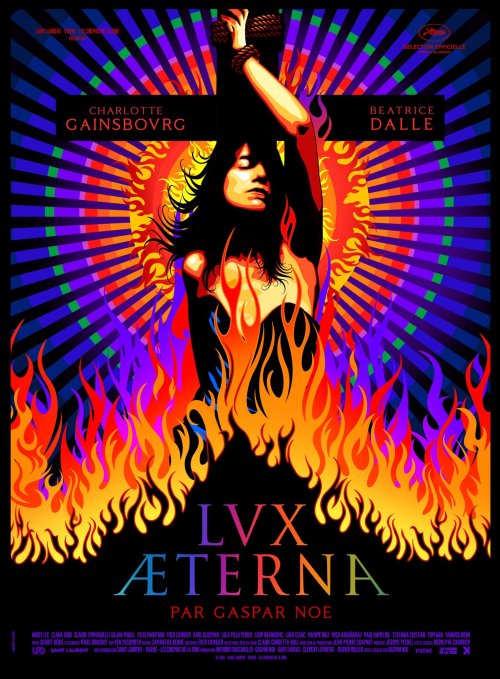 This bizarre 51 minute concoction from 2019 is pure Gaspar Noé from start to finish: a dark and intense psychodrama marked by technical bravura and a highly experimental thrust. It’s up to the viewer to decide if Noé’s efforts amount to misogynistic self-indulgence, a perceptive depiction of the filmmaking process from a female perspective, or an extended mockery of Noé’s own brand of cinema and those viewers who might take it too seriously. Strong arguments can be made for all three views.
This bizarre 51 minute concoction from 2019 is pure Gaspar Noé from start to finish: a dark and intense psychodrama marked by technical bravura and a highly experimental thrust. It’s up to the viewer to decide if Noé’s efforts amount to misogynistic self-indulgence, a perceptive depiction of the filmmaking process from a female perspective, or an extended mockery of Noé’s own brand of cinema and those viewers who might take it too seriously. Strong arguments can be made for all three views.
It opens with clips from the witch hunting themed films HAXAN (1922) and DAY OF WRATH/VREDENS DRAG (1943). The latter is especially crucial to Noé’s intent, as quotes from its creator Carl Theodor Dreyer (and also Jean-Luc Godard and Rainer Werner Fassbinder) are scattered throughout LUX ÆTERNA, starting with “We filmmakers have a big responsibility. It’s is up to us to raise the film from an industry to an art form.” That may have been intended as a straightforward mission statement by Noé or a sly bit of self-deprecating humor (of the type his pal Lars von Trier frequently employs on and off the screen).
The setting is a claustrophobic soundstage where two women, Béatrice Dalle and Charlotte Gainsbourg (played by, appropriately enough, Béatrice Dalle and Charlotte Gainsbourg), are engaged in conversation. The former is directing an avant-garde film about witch burning and the latter is the star. Theirs is a lengthy discussion that ranges from witch burning to some of the creepier guys they’ve been with (both reveal they’ve have had partners who ejaculated on their legs), presented in split screen format.
Split screens are constants in a film that frequently switches aspect ratios and points of view. One POV is provided by a crewmember with a video camera, who’s been tasked with filming Béatrice’s every move in the hope that she’ll do something to jeopardize her position. This is due to the film’s producer, who’s admittedly hired Béatrice because she’s a “name,” and is now anxious to get her fired.
Béatrice grows increasingly temperamental, and takes to storming off the set and shouting at everything in sight. Morale among the cast and crew plummets steadily, and even the mild-mannered Charlotte loses her composure after calling home and learning that her young son has been injured in a botched tattooing. From there madness inevitably overtakes the production as “reality” becomes increasingly intertwined with the staged action.
Gaspar Noé’s trademarks are well displayed and lathered on with (presumably) a healthy sense of self-parody, most notably in the multi-colored flicker-show (justified dramatically as a “lighting malfunction”) that concludes the film. A similar sense of meta-reference powers Béatrice Dalle’s performance, which seems predicated on Dalle’s well-publicized off-screen exploits (which over the years have become better known than her acting).
Overshadowing most everything is Noé’s enviable command of the medium. Cinematographer Benoît Debie’s prowling steadicam visuals are seamlessly integrated with the heavily improvised dialogue exchanges in an atmosphere of slow boiling intensity. There’s very little in the way of violence or nudity, a surprise given that the director is legendary for his love of shock, and his two leading ladies are known for their uninhibited approach (for the record, there is some nudity, but it’s by co-star Abby Lee).
The film ultimately plays much like Noé’s previous effort CLIMAX (2018), albeit without the focus and simplicity that distinguished that film. LUX ÆTERNA is, however, strongly recommended for adventurous viewers.
Vital Statistics
LUX ÆTERNA
Les Cinémas de la Zone/Saint Laurent/Vixens
Director: Gaspar Noé
Producers: Gary Farkas, Lucile Hadzihalilovic, Clément Lepoutre, Olivier Muller, Gaspar Noé, Anthony Vaccarello
Screenplay: Gaspar Noé
Cinematography: Benoît Debie
Editing: Jerome Pesnel
Cast: Béatrice Dalle, Charlotte Gainsbourg, Mica Argañaraz, Loup Brankovic, Yannick Bono, Stefania Cristian, Clara Deshayes, Claude-Emmanuelle Gajan-Maull, Karl Glusman, Paul Hameline, Luka Isaac, Tom Kan, Abbey Lee, Félix Maritaud, Lola Perier
